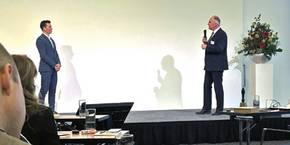Kategorien
Transformational trade 2025
Representatives from trade and industry from every corner of Switzerland and beyond met in Interlaken in mid-April for this year’s Swiss Shippers’ Forum. There they exchanged views on the challenges and opportunities of global foreign trade.
The Swiss Shippers’ Forum 2025, held in Interlaken as ever, has come and gone. In mid-April, abroad range of representatives from transport and logistics companies met up with shippers at the Hotel Victoria-Jungfrau and exchanged views on the challenges and opportunities facing international trade these days.
Daniela Schneeberger, a member of the swiss parliament and the president of the Swiss Shippers’ Council (SSC), was unfortunately unable to attend the event, so vice-president Patrick Keller delivered the opening remarks. He addressed the difficult framework that prevails in world trade today, as well as the increasing uncertainties to which international trade is now exposed.
A “slap in the face”
After Friedrich Christian Doepgen, a former editor-in-chief of the ITJ and the member for communication on SSC’s board of directors, delivered a short follow-up speech, Urs Furrer, the director of the Swiss federation of small and medium-sized enterprises (SGV), took the floor.
He began his speech with a quote from the sports world, citing Mike Tyson, to be precise. “Everybody has a plan until they get punched in the mouth,” the boxing legend once said. Furrer metaphorically described the current uncertainties dominating world trade as a “slap in the face.” His talk focused on the opportunities and challenges in supply chains.
Navigating the ‘compliance jungle’
Patrick Keller then returned to the rostrum and spoke about sustainable foreign trade. In this context, the central question is how companies can act sustainably and at the same time have their act together so that they can manoeuvre through what Keller exaggeratedly called ‘the compliance jungle’.
He went on to elaborate that in his opinion, sustainable management is only possible if it’s profitable. To help those present find their way through the ‘compliance jungle’ Keller presented some tips for their business models with regard to sustainable foreign trade.
After that a representative of the Basel-based Bank for International Settlements (BIS) talked about the global state of trade – without making any predictions as to its further development.
The ‘sustainable port of tomorrow’
After a short break, Howard Lamp from the port of Rotterdam continued with a presentation on the topic of “building the sustainable port of tomorrow.” After giving some information on the port of Rotterdam’s progress he addressed investment and the importance of the port in the trade of green hydrogen.
James Hookham from the Global Shippers Forum (GSF) then provided an overview of foreign trade and its current challenges in terms of tariffs and decarbonisation.
The latter has now been overshadowed by US tariff developments. “Without these tariffs we’d be talking about the decarbonisation of shipping,” he said.
The key points in Rieter’s strategy
The event then continued with a talk by Sven Fässler, the global category manager for logistics at the company Rieter, who first said a few words on the long history of his firm. He then moved on to the development of logistics “from its role as a cost factor to one that provides a competitive advantage.”
He dwelt on the key points of Rieter’s logistics approach, which focuses on strategic partnerships, agile supply chains, data-driven decision-making as well as on real-time visibility amongst the various factors that help the company to minimise its throughput times and to increase its customers’ satisfaction.
Customs duties and hazardous goods
In the course of the day and the next morning, other industry representatives and people with retail expertise spoke on various topics. From the middle of the first afternoon onwards those present were also able to attend two of a total of three interactive workshops.
These looked at some practical problems and offered some answers and advice, on the one hand. Another workshop focused on shipping hazardous goods and other dangerous substances.
Another topic that really had to feature, of course, was the impact of the newly-announced US tariffs on world trade. Dojö Consulting’s North American lead, Sean Miner, addressed this.

